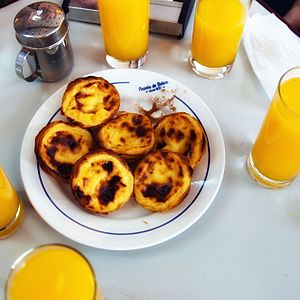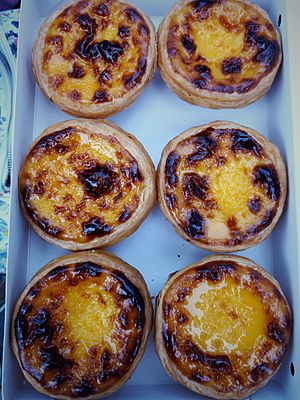Pastel de nata facts for kids

The typical appearance of the pastel de nata in Lisbon, Portugal
|
|
| Alternative names | Pastel de Belém Pastries of Bethlehem 葡撻 (Cantonese) |
|---|---|
| Course | Dessert |
| Place of origin | Portugal |
| Region or state | Saint Mary of Bethlehem, Lisbon (originally); produced worldwide within the Lusosphere |
| Created by | Religious of the Monastery of the Hieronymites |
| Serving temperature | Fresh from oven, with cinnamon and icing sugar |
| Main ingredients | Egg yolks |
| Variations | egg tart, custard tart |
| ca. 300 per 100 grams (3.5 oz) kcal | |
The Pastel de nata is a delicious Portuguese pastry. It's a small, round tart with a creamy egg custard filling. Sometimes, people sprinkle it with cinnamon powder. These tasty tarts are very popular in Portugal. You can also find them in other parts of the world. They are loved in places like Brazil, Macau, and East Timor. Even KFC sells a version of this tart in places like Hong Kong and China!
Contents
The Sweet History of Pastel de Nata
How Monks Created a Famous Dessert
The Pastel de nata was first made a long time ago. It was created before the 1700s by Catholic monks. These monks lived at the Jerónimos Monastery in Lisbon, Portugal.
Monasteries and convents used a lot of egg whites. They used them to starch their clothes, like the robes worn by friars and nuns. This left them with many extra egg yolks. So, the monks became very creative. They used these leftover yolks to make many sweet cakes and pastries. This is how many delicious dessert recipes spread across Portugal.
From Monastery to Bakery: A Secret Recipe
In the 1820s, big changes happened in Portugal. Many religious groups were shut down. The monks at the Jerónimos Monastery knew their home might close soon. To earn money, they started selling their pastéis de nata at a nearby sugar refinery.
In 1834, the monastery finally closed. The monks then sold their secret recipe for the tarts to the sugar refinery owners. In 1837, these owners opened a special bakery. They called it the Fábrica de Pastéis de Belém. Today, the same family still owns this famous bakery.
Visiting the Fábrica de Pastéis de Belém
The original recipe for the pastel de nata is still a secret. It is kept in a special room at the Fábrica de Pastéis de Belém. This bakery is the most popular place to buy these tarts. It's only a short walk from the Jerónimos Monastery.
The shop is very busy. It sells over 20,000 pastéis de nata every day! You can take them to go or eat them there. People often sprinkle their tart with cinnamon. They also enjoy it with a strong espresso coffee called a bica.
In 2009, a famous newspaper called The Guardian said pastéis de Belém was one of the 50 "best things to eat" in the world. In 2011, people in Portugal voted for their favorite foods. The pastel de nata was chosen as one of Portugal's Seven Wonders of Gastronomy. This shows how much people love this special tart!
Pastel de Nata Around the World
Asian Influences and New Flavors
Portuguese traders visited Japan in the 1500s. They brought many new ideas, including food. Japanese words like pan (meaning bread) come from the Portuguese word pão. The pastel de nata also became popular in Japan.
In Japan, people even created new versions of the tart. Some pastéis de nata are made with green tea flavoring. These green tea tarts became so popular that they were sent to other countries. You can now find them in places like South Korea and other parts of Asia.
See also
 In Spanish: Pastel de Belém para niños
In Spanish: Pastel de Belém para niños
 | Bayard Rustin |
 | Jeannette Carter |
 | Jeremiah A. Brown |


